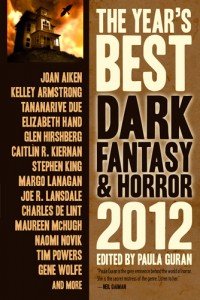“The Lake” by Tananarive Due will be appearing in Prime’s forthcoming Year’s Best Dark Fantasy & Horror: 2012 edited by Paula Guran. Pre-order here!
I caught that “Mary Kay” reference. Speaking of, “The Lake” has this real-world subtext to the narrative that really creates tension, even more than the supernatural bits. So, tell me, what’s more terrifying to you: horror stories or real life? Why?
I find real life much more terrifying than horror fiction. In recent months, while my mother was very ill (she passed away Feb. 7th), I often found myself crying as I listened to the news. I’m so offended by the public airing of 911 tapes, when people are at their most frantic and vulnerable. I often say I could never write true crime, because it would be too soul-killing. So, yes, in “The Lake” I used a dash of real-life horror too add tension to the story … and convey my feelings about predators in schools. I wrote that story as the mother of a young son.
In an interview you did with CNN, you said Stephen King was a role model because he could create “universal characters.” How would you define a “universal character,” and, more importantly to me as a writer, how do you know if you’ve created “universal characters” in your fiction?
I’m a firm believer that a large percentage of Stephen King’s readers aren’t necessarily “horror” fans, but they’re drawn to his stories–and especially his characters. King is an expert at creating a degree of psychological realism that makes readers believe that everything they’re reading is real enough to touch. That’s what I strive for in my writing–stories and characters rendered so realistically, dealing with issues that face us all, that all types of readers will be drawn to them.
This story has a very southern gothic feel to it. What do you think it is about southern settings that inspires so many gothic stories?
“The Lake” is set in the fictitious town of Graceville, Florida (not to be confused with the real Graceville, Florida), and it’s part of an ongoing series of short stories I have written set in a town where characters experience paranormal experiences during the summers.
Another of my Graceville stories is a novella called “Ghost Summer,” in which some children come across the ghosts of missing black boys whose disappearance sparked a race riot in the 1920s. Townspeople believed the boys were the victims of racial violence, but they’d been chased into the woods by a loose dog and fallen into a well. The town suffered a lot of bloodshed over that misunderstanding. There was so much pain, so many untold stories, buried in the South. As writers, we feel those secrets whispering to us.
